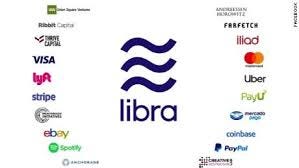Latest news about Bitcoin and all cryptocurrencies. Your daily crypto news habit.

Libra IS:
- Designed to be a medium of exchange for consumers & retailers globally
- A private blockchain, controlled by its members
- An asset that is backed by a basket of other assets
Libra IS NOT:
- Censorship resistant
- Exempt from the machinations of central bank monetary policy
Starting with what Libra is, I will focus on its characteristics as a tradeable asset. (Most of the commentary to date has focused on Facebook’s bold attempt to capture the transactions of billions of consumers globally and a lot has been written about the lack of decentralization. I will confess to being more than a little concerned about so much power and personal data being collected by them, and I also see the issues with the potential control over the transactions using the coin by the Libra consortium . That said, I will leave those concerns to others to discuss, but, instead, will focus on potential regulatory and transactional issues with its design.)
To understand why I think it is far from clear that Libra can escape regulatory issues in the US, consider how Libra operates. It is an exchangeable asset, in many respects quite like an Exchange Traded Fund (ETF) for a basket of currencies, except that Libra will not trade on regulated exchanges. It features a mechanism to create or redeem units of Libra tokens that is very similar to how ETF “Authorized Participants” (APs) do so. Libra will also trade on (crypto) exchanges relying upon market makers (often APs) and arbitrageurs to keep the traded prices in line with its underlying value, which is the same as ETFs. In fact, it is so much like an ETF, I would be stunned if the SEC does not at least contemplate asserting that it has jurisdiction over the market for Libra tokens.
The main argument against SEC jurisdiction is that, since it will likely be predominantly dollar backed, it might be hard to make the case that US investors will trade Libra for the “expectation of profit.” Frankly, that argument rings somewhat hollow, since it will not be 100% dollar backed and there are many exchange traded funds that are backed by baskets of currencies. All of that said, whether or not the SEC intervenes, there are potential issues with Libra’s transactional mechanism as things stand today.
The main issue, at the present time, is that, unlike ETFs, while Libra asserts they want to have a “network” of exchanges to trade the coin, such exchange cooperation only exists in a limited form, via private networks such as CoinRoutes. Today, even in the most liquid crypto-assets, there are often significant price discrepancies between prices on different exchanges. Investors, as a result, routinely suffer significant costs as many buy or sell on one crypto exchange at a time.
Thus, while the project holds great promise, the cost of transacting (to investors in their own currency) will often be impacted by Libra’s deviations from “fair” value that are common with fragmented markets. (This is in addition to exchange fees and bid/offer spreads.) It should be stated that CoinRoutes has been created to help investors navigate this set of problems, but as of the time I write this note, we are not part of the Libra consortium…
As far as what Libra is not, it is not a non-sovereign store of value. In fact, it explicitly ties its value to sovereign currencies. As a result, on the positive side, people in geographies where there is little to no confidence in their own currencies will likely find more confidence in Libras ability to hold value. All users of the coin, however, will still be subject to FX fluctuation.
Perhaps more important, the Libra project does little to diminish the macro case for Bitcoin as the only currency that can’t be printed based on the whims of a sovereign entity. (Unless, of course, Bitcoin is added to the “basket” and grows to a materially significant share…)
The more apt comparison for Libra is not a replacement for Bitcoin, but rather that it is a private market global currency, not unlike the International Monetary Fund’s (IMF) creation of the Special Drawing Right (SDR). The SDR also is backed by a basket of sovereign currencies and is used by the IMF and its members.
Unlike the SDR, however, which was created and is used with direct input from governmental entities, Libra is a private solution with potentially much more utilization. As a result, it potentially heralds a transfer of monetary power away from central banks, as the Libra foundation (and the organizations on it) could have significant power to devalue currencies simply by changing their weights in their basket. I suspect that such power will attract the attention of those central banks, and the national regulators in each country, but only time will tell.
In the end, this story is far from over. It is one of many steps towards the inevitable digitalization of commerce and capital markets and I am excited to see where it leads.
What IS Libra & What it IS NOT was originally published in Hacker Noon on Medium, where people are continuing the conversation by highlighting and responding to this story.
Disclaimer
The views and opinions expressed in this article are solely those of the authors and do not reflect the views of Bitcoin Insider. Every investment and trading move involves risk - this is especially true for cryptocurrencies given their volatility. We strongly advise our readers to conduct their own research when making a decision.